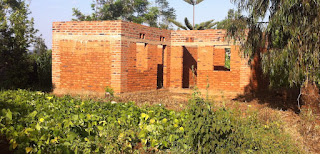Walking around Karatu, I've noticed a lot of people are building houses. A lot of houses. Last week, I counted the construction projects on my walk to work. I live about a mile from the hospital, and my commute passes through a fairly rural setting. There are 18 houses under construction, eight new houses (finished in the last six months) and 12 extensions being added to existing homes, all along one mile of unpaved, country road. That seems like a lot to me, and it's not bounded by economic status. Everything from one-room mud huts to (what pass for) mansions are sprouting like crocuses on the first day of spring.
The construction along my morning commute represents a small example of a larger phenomenon visible in most parts of Karatu. There's a brick-laying bonanza going on, and it's making me wonder: why is everyone building right now?
I've thought about it over the past week and came up with a few possible answers. Please note that what follows is pure speculation, based on my personal experience from living here over the past two years. No effort was made to consult expert opinion, quantify information or conduct rigorous analysis of any sort whatsoever. With that caveat, here are my explanations:
1. High fertility rate
People are popping out babies like crazy. Children are everywhere. We are suffering an acute staffing shortage at the hospital because one third of the housekeeping staff managed to get pregnant at the same time. That's no exaggeration; their due dates are within one week of each other. Tanzania's census service estimated the total fertility rate of 5.4 children per woman in 2010. Compare that to 1.9 in the USA, and keep in mind that the true rate in Karatu is probably higher than the nationwide statistic because fertility rates tend to be higher in rural areas. The fact is there are more and more people living here, and people need houses to live in.
2. Improved transportation
Karatu is like the American railroad boom towns of the nineteenth century. Last year they finished the paved road from Arusha—the only paved road in the district—which makes it worlds cheaper to move people and goods back and forth to the third largest city in the country. The paved road cut the travel time to Arusha from seven hours to two. It's also funneling ever-growing caravans of tourists to visit Ngorongoro and the Serengeti and bringing their dollars and euros to the lodges and lodge employees. It also brings driver-guides and their shillings to the guest houses, bars and brothels—not an inconsequential economic boost either. Not only are there more people to house but there's more money to do it with.
3. Lengthy construction times
Building a house can take a very long time here. Some of the sites I tallied in my informal survey have been under construction since I first arrived. A big reason why you see so much building going on is that you are seeing the overlap of many years' worth of projects. Nobody waits until they have enough money to build the whole house before they start. When you have enough money for a foundation, you build the foundation. When you get money for bricks—maybe a few years down the road—you buy bricks. When you find money for mortar—a few more years—you build the bricks into walls. There's a very practical reason for doing it this way, and it has a lot to do with the my final factor...
4. Houses are illiquid
Nobody is going to ask to borrow your half-built house to help pay their water bill. If you kept the money in cash, someone would ask for it. In individualistic, Western countries, it's hard to say no when a family member asks for financial help. In a society where social support is built entirely on family and community ties, it's impossible. When Cousin Emanuel comes knocking because the crop failed again and the cow died and he can't afford water and think of the children... you had better pay up or ostracism awaits. If there's two things we have no shortage of in East Africa, it's relatives and problems. The only way to hang on to your money is by turning it into something illiquid as quickly as possible. When payday comes, you go straight from the bank to the brickmaker. Even if half your bricks get destroyed by rain waiting for roofing tin, that's better than losing all of your construction budget to Aunt Balbina's medical bills while you wait.
I'm sure there are some other factors at work. I have no idea how important each of the factors above are, though I suspect the last one is the biggie. It's interesting for me to experience the process of getting to know a place. First you might not even notice details, then you see them but not the reasons for them—at this stage, it's tempting to conclude that there are no reasons and people are being senseless—then you begin to put the pieces together and understand the underlying forces shaping people's behavior. Or maybe you just think you do, and there are still more layers to peel back. This is all just wild speculation after all.





